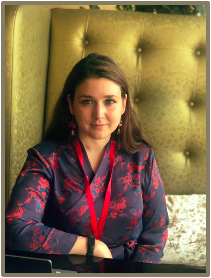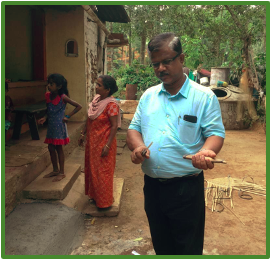© 2022 Galina Borisovna KOPELIOVICH, Mysore Rajagopal GANGADHAR
MA&B 2022 – № 2(24)
DOI: https://doi.org/10.33876/2224-9680/2022-2-24/11
Citation:
Kopeliovich G.B., Gangadhar M.R. (2022) Obsuzhdenie sovremennykh issledovanij medicinskikh praktik plemen Indii na X Mezhdunarodnom kongresse medicinskikh antropologov [Discussion of modern research of medical practices of Indian tribes at the X International Congress of Medical Anthropologists], Meditsinskaya antropologiya i bioetika [Medical Anthropology and Bioethics], No. 2(24).
 Kopeliovich Galina Borisovna –
Kopeliovich Galina Borisovna –
Master of Public Health;
Postgraduate student of the Department of Anthropology, University of Mysore
(Karnataka, India)
https://orcid.org/0000-0003-2891-4798
E-mail: samurova-s@yandex.ru
Professor of Anthropology;
Director of the Department of Anthropology, University of Mysore
(Karnataka, India)
https://orcid.org/0000-0003-4399-0377
E-mail: gangadharmr@gmail.com
Keywords: India, tribal studies, medical practices, Bhil, Kolam, Ayurveda, Traditional folk medicine, transfer of medical knowledge.
Abstract: In this review article the authors consider the main topics and reports made within the section “Transfer of medical knowledge in local communities in India”, held during the X International Interdisciplinary Scientific and Practical Congress of Medical Anthropologists in Moscow (IEA RAS; online). The speakers introduced the audience to the research of medical practices of the tribes of the west, north and south of India. The section was organized in partnership with the Department of Anthropology of the University of Mysore (Karnataka: India) and with the Association of Medical Anthropologists of India (Mysore). The transfer of medical knowledge in local communities is a relevant topic in Indian anthropology, and therefore it aroused great interest among Indian anthropologists. One of the main speakers was Professor P.S. Joshi, the leading medical anthropologist in India, who has studied medical practices of various Indian tribes for many years. The conference was attended by Dr. Kshatri, who has devoted a long time to the research of the Bhil tribes living in different parts of India. The report of Professor Aarti Nagarkar aroused great interest. The professor is the Head of the Department of Health Sciences at the University of Pune; her research was devoted to the practices of traditional folk medicine in the prenatal and postnatal period. This work was carried out with the participation of doctors of Western medicine, anthropologists and sociologists of medicine. In general, the section aroused great interest, there were many questions and clarifications from the Russian audience.
References
Behera M. C. (2019). Tribal Studies – A Need for Inclusive Development, The Researchers, Vol. V, No 1, pp. 42–56.
Hardiman D. (2006). Knowledge of the Bhils and their Systems of Healing, The Indian Historical Review, Vol. 33, No. 1, pp. 202–224.
Kleinman A. (1980). Patients and Healers in the Context of Culture: an Exploration of the Borderland between Anthropology, Medicine and Psychiatry. Berkeley: University of California Press.
Nagarkar A. (2012). Exploring new horizons: medical anthropology in public health, International Review of Social Sciences and Humanities, Vol. 3, No. 1, pp. 170–175.
Naik T. B. (1968). What a tribe: Conflicting Deflicting, Applied Anthropology in India. Ed. by L.P. Vidyarthi. Kitab Mahal, Allahabad, pp. 69–80.
Nayak P. K., Rajakishor K. Mahana, Marinescu A. (2019). Indigenous / Tribal Studies, India Rom. Jour. of Sociological Studies, New Series, No. 2, pp. 67–73.
Joshi P. C. (2019). Ethnomedical practices and Indian scheduled tribes, Rom. Jour. of Sociological Studies, New Series, No. 2, pp. 111–124.
Thapar R. (1971). The Image of the barbarian in early India, Comparative Studies in Society and History, 1971, Vol. 13, No. 4, pp. 408–436.
